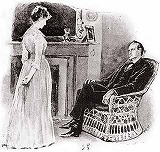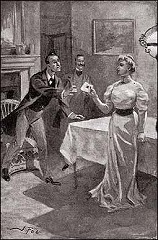We had pulled up in front of a large villa which stood within its own grounds. A stable-boy had run out to the horse’s head, and springing down I followed Holmes up the small, winding gravel-drive which led to the house. As we approached, the door flew open, and a little blonde woman stood in the opening, clad in some sort of light mousseline de soie, with a touch of fluffy pink chiffon at her neck and wrists. She stood with her figure outlined against the flood of light, one hand upon the door, one half-raised in her eagerness, her body slightly bent, her head and face protruded, with eager eyes and parted lips, a standing question.
“Well?” she cried, And then, seeing that there were two of us, she gave a cry of hope which sank into a groan as she saw that my companion shook his head and shrugged his shoulders.
“No good news?”
“None.”
“No bad?”
“No.”
“Thank God for that. But come in. You must be weary, for you have had a long day.”
“This is my friend, Dr. Watson. He has been of most vital use to me in several of my cases, and a lucky chance has made it possible for me to bring him out and associate him with this investigation.”
“I am delighted to see you,” said she, pressing my hand warmly. “You will, I am sure, forgive anything that may be wanting in our arrangements, when you consider the blow which has come so suddenly upon us.”
“My dear madam,” said I, “I am an old campaigner, and if I were not I can very well see that no apology is needed. If I can be of any assistance, either to you or to my friend here, I shall be indeed happy.”
“Now, Mr. Sherlock Holmes,” said the lady as we entered a well-lit dining-room, upon the table of which a cold supper had been laid out, “I should very much like to ask you one or two plain questions, to which I beg that you will give a plain answer.”
“Certainly, madam.”
“Do not trouble about my feelings. I am not hysterical, nor given to fainting. I simply wish to hear your real, real opinion.”
“Upon what point?”
“In your heart of hearts, do you think that Neville is alive?”

Sherlock Holmes seemed to be embarrassed by the question. “Frankly, now!” she repeated, standing upon the rug and looking keenly down at him as he leaned back in a basket-chair.
“Frankly, then, madam, I do not.”
“You think that he is dead?”
“I do.”
“Murdered?”
“I don’t say that. Perhaps.”
“And on what day did he meet his death?”
“On Monday.”
“Then perhaps, Mr. Holmes, you will be good enough to explain how it is that I have received a letter from him to-day.”
Sherlock Holmes sprang out of his chair as if he had been galvanized.

“What!” he roared.
“Yes, to-day.” She stood smiling, holding up a little slip of paper in the air.
“May I see it?”
“Certainly.”
He snatched it from her in his eagerness, and smoothing it out upon the table he drew over the lamp and examined it intently. I had left my chair and was gazing at it over his shoulder. The envelope was a very coarse one and was stamped with the Gravesend postmark and with the date of that very day, or rather of the day before, for it was considerably after midnight.
“Coarse writing,” murmured Holmes. “Surely this is not your husband’s writing, madam.”
“No, but the enclosure is.”
“I perceive also that whoever addressed the envelope had to go and inquire as to the address.”
“How can you tell that?”